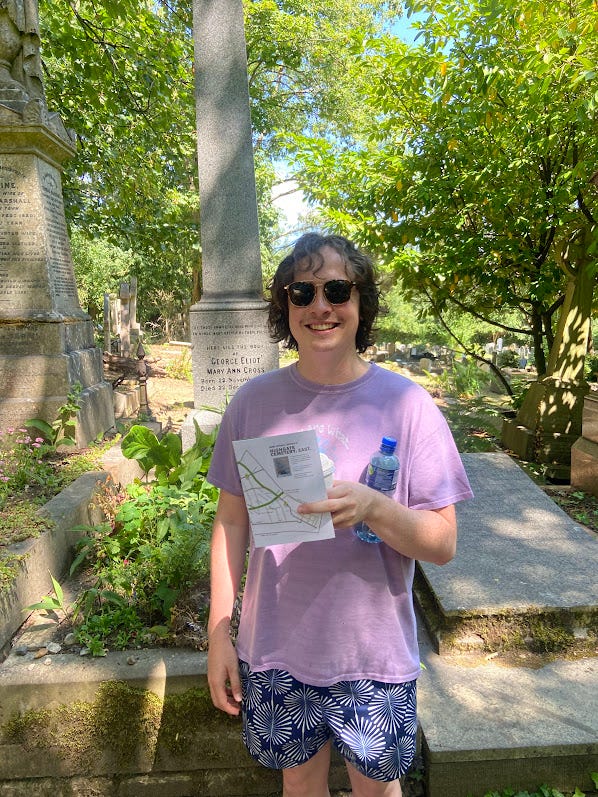One of my favourite books is Life With Picasso by Francois Gilot. Gilot was in her early twenties when she met Pablo Picasso in a restaurant, and he three times older. A likely false story about Picasso in restaurants is illuminating. At the proprietor’s asking, he doodles on a napkin, but won’t sign it. Why? He is thanking the proprietor for the restaurant, not buying him another one.
He is a colossus when Gilot meets him, but a black hole as much as a star. All his past women either stay in his orbit or commit suicide. Only Gilot leaves him and survives on her own terms. Throughout her account of life with him, she exhibits amazing self-possession. She died at a hundred and one, in June 2023.
2023, at least so I have now dramatised it in my head, was the year I left my normal job and normal path in order to finish my novel. It was hard to decide and then hard to live. But I just felt I had ended up at a hope I had to heed. If I was to fail it, I had to fail resoundingly. I even worried that a retreat would stay in me, and that that would mean a less good wife and then kids who could not help but see the retreat in me.
The December before was cold and sunny with lots of time to read and think before glittered snow. I read many of my favourite books for the first time. Bright Lights Big City, Cannery Row, Tortilla Flat, Thank You Jeeves, Pale Fire, The Captive Mind, Super-Infinite, Trespasses, and finally Life With Picasso.
Also that month, sadly, my grandad died. Then in January my backpack, containing the notebook I had filled with memories of him, was stolen from a pub. The desperate search was maybe my worst night ever. Still I hate to visit Finsbury Park, where I followed the card payments to. Or to see the Chandos on Trafalgar Square, where the bag was stolen from. I hate that one especially because before the theft it was the pub where my parents first met and I loved going there.
But my colleague and great friend Rachel saw me sad in the office, then bought me a new notebook and put a Picasso quote inside. “Every act of creation is first an act of destruction.” One of the kindest things ever done to me. At my leaving drinks two months later, my other colleague and great friend Sarah got me an album of Picasso paintings.
After leaving I had no future and that was hard. I leaned on Gilot’s words about catastrophes we ought to meet. Italics mine.
“You’re headed for a catastrophe,” she said. I told her she was probably right but I felt it was the kind of catastrophe I didn’t want to avoid. She went back to Montpellier and I went back to Pablo.
I have mentioned before my favourite New Statesman piece ever, Why Picasso? by John Berger. Now I actually run the new archive page at the back of every issue. So I will get the full thing out for you eventually. For now I will just sum up Berger’s reasons why “the scrappiest work by Picasso is so disproportionately compelling”.
Those who petulantly and sceptically say “You only admire it because it's been done by Picasso”, are in a way quite right. In front of Picasso's work one pays tribute above all to his personal spirit. What makes him great are not his individual works but his existence, his personality. His achievement is not that he himself has developed these things, but that he has always been irrepressible, has never been at a loss. The extraordinary confidence behind every mark he makes - it is the confidence of the born performer: it is Picasso's simple and incredible vitality that is his secret. To future generations our estimate of Picasso will seem exaggerated; we are absolutely right to hold this exaggerated view because it is the present existence of this spirit that we celebrate.
I will write about him Picasso more. In fact a few essays could come to a nice leaflet. But I was just thinking about him – and myself! – as I have been feeling grateful about this page passing a year. I called my ebook of the year’s writings The Immature and the Immortal. It’s a Nabokov quote but could describe Picasso, who said it took him four years to paint like Raphael but a lifetime to paint like a child.
Actually Nabokov’s Pnin includes “that Van Gogh is second-rate and Picasso supreme.” As for Van Gogh, Picasso says in Gilot’s book that “the individual adventure always goes back to the one which is the archetype of our times: that is, van Gogh’s—an essentially solitary and tragic adventure.”
So it is all hard to get right. But so far anyway I’ve felt glad to have met my very modest catastrophe. Now I have a picture of my girlfriend by Picasso’s The Dreamer and I am doing this great job.
I can take pitches now, and want yours, so fire away. This week I edited the bruiser Faye Curran saying “I’m Irish, but don’t kiss me, in fact fuck you” and BBC journalist Jacob Boswall monitoring TalibanTok for clues to jihad’s changing face. I myself wrote up the end of Rishi Sunak’s sabbatical.
Have a great weekend,
GM





It’s a Nabokov quote but could describe Picasso, who said it took him four years to paint like Raphael but a lifetime to paint like a child.
Reminds me of that line Nabokov’s himself, something like “I think like a genius, I write like a distinguished author, I speak like a child”